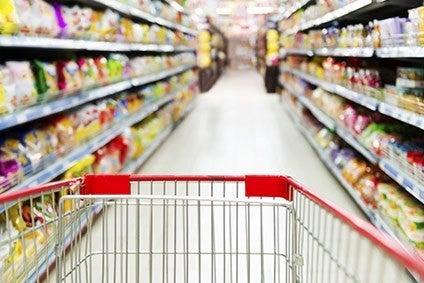
Food manufacturers and retailers operating in the UK – including Nestle, Unilever, Tesco and Asda – have signed up to cut food and drink waste in the country by a fifth in ten years.
The goal was one of three outlined today (15 March) in the latest iteration of The Courtauld Commitment, a programme to reduce waste first launched in 2005.
Suppliers, which also include Associated British Foods, Arla Foods and Premier Foods plc, have also pledged to cut the “greenhouse gas intensity” of food and drink consumed in the UK by 20% by 2025. A third goal was also made for “a reduction in impact associated with water use in the supply chain”, although the signatories have yet to agree on a specific metric for the target.
The latest phase of The Courtauld Commitment was announced by WRAP, a UK charity that focuses on promoting the reduction of waste and the efficient use of resources. WRAP has overseen the pledges made under The Courtauld Commitment since they were first announced 11 years ago.
“To safeguard UK food we need a step-change to increase sustainable food and drink production and consumption, conserve resources and combat climate change. Courtauld 2025 will do this,” Dr Richard Swannell, director of sustainable food systems at WRAP, said. “This is an ambitious undertaking and having key signatories on board on day one puts us in a strong position at the start of this new era for our food industry.”
See Also:
WRAP said it plans to work with the UK food sector on “embedding sustainable principles and practices into the design, buying and sourcing of food”, “optimising resource efficiency” throughout supply chains, influence consumer behaviour to reduce waste at home and devise “innovative ways to make the best use of surplus and waste food”.
How well do you really know your competitors?
Access the most comprehensive Company Profiles on the market, powered by GlobalData. Save hours of research. Gain competitive edge.

Thank you!
Your download email will arrive shortly
Not ready to buy yet? Download a free sample
We are confident about the unique quality of our Company Profiles. However, we want you to make the most beneficial decision for your business, so we offer a free sample that you can download by submitting the below form
By GlobalDataThe results under the various stages of The Courtauld Commitment have been mixed.
Last autumn, WRAP announced measures under the last phase of the commitment to cut ingredient, product and packaging waste and to lower carbon dioxide emissions associated with packaging were ahead of target.
However, in 2013, WRAP admitted a target put together under the second phase of the commitent to reduce household food and drink waste in the UK had been missed. In 2010, WRAP admitted signatories to the first phase had failed to meet a target to reduce packaging waste.
Reflecting on today’s announcement, UK resources minister Rory Stewart said: “Food waste – at any stage from the farm to the house – is something we should avoid. It wastes precious water and resources. Under the last framework we have already reduced food waste in the supply chain by ten per cent. And this team-work and leadership should allow us to go much further.”
Dan Kolding, senior vice president for supply chain at Arla’s UK arm, which was one of the founder signatories to The Courtauld Commitment, said the new pledges meant the co-operative could “work collaboratively with our retail customers to drive forward reductions in the environmental impact of food production”.
Nestle echoed Arla’s comments on working with other stakeholders. Andy Griffiths, head of environmental sustainability at Nestle’s UK business, said the public, private and voluntary sectors could work together. “As we face into the key challenges of resource availability and the impacts of climate change, it is critical that we work collaboratively to identify and implement effective solutions.”
The Rubbish Diet, a blog set up to help cut household waste, is also one of the signatories to the new set of commitments. Karen Cannard, the blog’s founder and author, said: “We’ve signed to show our support and to bring the issues that we at home face in reducing food waste into the frame.”
#Courtauld2025 has never come at better time – tackling food waste helps reduce #climatechange & H2O consumption pic.twitter.com/XbL85uEo5k
— Unilever UK & IRE (@UnileverUKI) 15 March 2016
We’re proud to be part of #Courtauld2025 – the world–leading voluntary agreement to reduce the environmental impact of our food and drink.
— The Co-operative (@TheCooperative) 15 March 2016
Great news on #Courtauld2025! Tremendous progress made on this and #foodwaste in general. https://t.co/NyjzADxSGE
— Anne Jenkin (@Baronessjenkin) 15 March 2016







